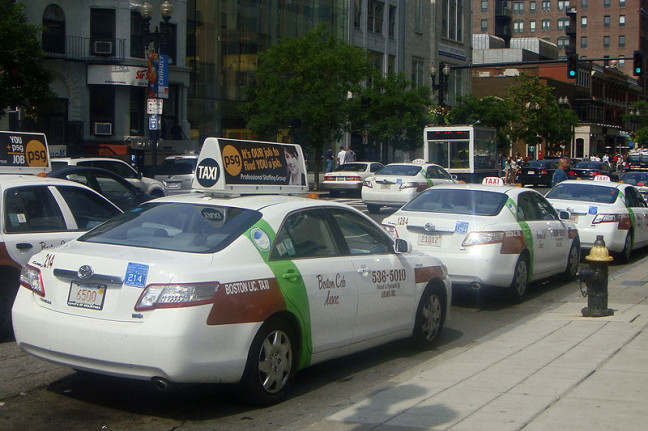
There’s an obvious reason why the ongoing feud between Uber and Boston taxi drivers has gotten so testy: money. Uber is making more of it. Cabbies are making less of it. And the owners of taxi medallions–the lucrative licenses to operate a cab–are about to take a haircut.
Or are they?
The Boston Taxi Drivers Association, the union that organized a « rolling rally » protest outside Uber Boston headquarters in May, says Uber’s popular, low-cost uberX service has cut into the City’s regulated cab business by upwards of 30 percent. That sounds bad for medallion owners. But since uberX debuted, the value of the taxi medallion has – inexplicably – gone up.
In 2004, here’s what Boston magazine’s Chris Berdik wrote:
In many ways, it’s all about the medallion, that small metal square attached to every one of Boston’s 1,825 taxis. Medallions were introduced in the 1930s to curb a glut of cabs on city streets. The number was capped at 1,525 and remained there for six decades until a 10-year legal battle led to 260 more being sold at auction in the late 1990s.
Not only has the archaic, city-sanctioned monopoly managed to survive 80 years, along the way it’s made multimillionaires out of individuals like Eddie Tutunjian, owner of 384 medallions and the Boston Cab garage.

Tutunjian, as of October 2013, effectively controlled 21 percent of Boston’s billion-dollar taxi industry, which uberX is now threatening to make extinct. At least, that’s the logical chain of thought.
The more pickups uberX drivers make, the less fares Boston cabbies collect, the less valuable medallions become.
Last March, a month after uberX launched, the Boston Business Journal estimated the purchase price for a medallion at $500,000 to $600,000. A year later, what’s the going rate for a Boston taxi medallion? The answer: $700,000.

« The market dictates a medallion’s value, » Donna Blythe-Shaw, a spokesperson with the BTDA told BostInno in phone a call. But $700,000, now? In 2014? When ridesharing services like uberX are cutting into cab companies’ revenues?
This appears to be the case, if the figures in the image above are accurate. The figures were published by an independent taxi industry monthly newspaper, Carriage News (which costs just $2 a month for a subscription) and sent to BostInno by Blythe-Shaw.
Uber debuted a beta version of its uberX service to Boston users in February 2013. Almost a year-and-a-half later, uberX is the established industry choice among consumers. But, as recently as February 26, 2014, medallions have been trading at prices as high as $700,000.
Equating medallion ownership to residential real estate, Blythe-Shaw explained, the monthly « mortgage rate » for one $700,000 medallion is $4,000 – or $48,000 per year.
Most medallion owners collect rent from shift drivers, who pay upwards of $500 per week – translation: $24,000 per year – just to drive a taxi. Owner-drivers – medallion owners who drive a taxi they’ve purchased – have it worse.

Though owner drivers can make considerably more than part-time shifters, kingpins like Tutunjian – after making fortunes, anyway – won’t be working as cabbies; while $700,000 may be chump change for the city’s wealthiest medallion hoarders, to owner drivers, it’s their « entire livelihood, » Blythe-Shaw said.
This owner driver population – many of which are immigrants, speaking English as a second language, said Blythe-Shaw – have either taken out loans or put down a portion of their life savings in order to finance medallion purchases.
As long as Boston’s taxi monopoly remains in effect, owner drivers stand to see a return on their investment, and medallion owners can continue to collect high rental fees from shifters.
But uberX and other ridesharing services could, ultimately, force changes in Boston’s regulated taxi industry, leaving medallion owners on the hook, financially. « Medallions, » the Globe’s Tom Keanewrites, « are like any other investment, with no guarantees about their value. »
Boston Mayor Marty Walsh has said there’s a way to « balance » app-based ridesharing services and the city’s taxi industry. If this balance isn’t achieved, politically connected medallion owners could, as they did in Chicago, turn their eyes towards City Hall, demanding taxpayers foot the bill for investments that went bust.
For now, despite uberX’s incursion, that doesn’t seem likely. Those investments are booming.
Tables via Boston Taxi Consultant Report
Source : Bostinno
